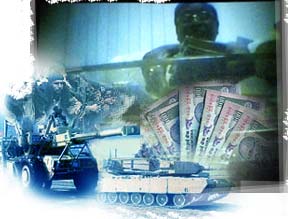The Rediff Special/ Lt Gen Ashok Joshi (retd)


During the preceding week, Indian cricket seemed to be sliding down at an alarming rate, keeping pace with the stock market. Just when the gloom seemed complete, came the revelations of Tehelka.com on March 13.
Although pending further inquiry, it would be wrong to presume that the tapes and revelations truly reflect what they purport to, they seem to have transferred the burden of proving themselves innocent on the shoulders of those whose names and faces have appeared in murky light on those tapes. The same goes for the voices, whether disembodied or not, for so long as they are recognisable.
None of this comes as a great surprise to the Indian public brought up on a steady diet of shady defence deals, whether of jeeps, aircrafts, howitzers, or submarines. And that is only a short list. We are told, that this time the sums involved are bigger, the spread of operatives is more far reaching, and therefore the matter is more serious and reprehensible than in the past.
Even without giving credence to this logic, or accepting the credibility of the tapes, the disclosures are truly disturbing. They purport to show the involvement of officers of the armed services -- the Services -- in facilitating defence deals for a consideration.
If one were to believe the tapes, a fair number of serving officers seem to have become infamous 'middlemen'. The conduct of four officers, at least, is being seriously inquired into. They seem to have undertaken to do the bidding of their paymasters -- anything and everything -- for '30 pieces of silver'. This is where the corruption hurts the Services the most.
Way beyond the evil that arises from the loss of funds that could have been turned to better purpose, it is the direct involvement of the Services's officers that does the maximum damage. Even the purchase of equipment that is either unnecessary, inadequate, or less than suitable, may prove less damaging in comparison with the malaise that may shake the faith of rank and file in its leadership.
The Services are meant to apply combat power to protect and promote national interests. Several factors are crucial in their being able to generate the full range of their combat power: Balanced man-machine mix, organisational strength, and professionalism of Servicemen, to name the most important ones. The last of these is the weightiest. Professionalism implies several things, but here we are concerned with the commitment to uphold professional values.
There is a set of professional values for Servicemen that must he upheld. These are not necessarily different from those to which civil society contributes. The difference is one of emphasis: Perhaps, loyalty is the first of the Serviceman's values. Loyalty to superiors, equals, and subordinates. This implies that he will place himself at a disadvantage, if need be, in relation to all his comrades-in-arms in the interest of the collective good, or task achievement.
There is a deliberate emphasis here on a spirit of sacrifice. Other principles, beliefs, and 'isms' have no place here. Maybe it is part of the 'tribal' culture. But without it, the Services cannot function. Courage and commitment to the achievement of the given task, without questioning its rationale, are other salient values that go into the creation of a distinct subculture.
An infantryman is expected to get up on a dark night, when under fire, and charge, when he is asked to. What is it that motivates him? Faith in leadership -- its judgement, efficiency, and parental attitude. A somewhat exaggerated sense of 'honour', which seeks fulfillment in doing what he has been bid to do, and self-esteem. He sees himself as a part of the hierarchy that stretches from the commander-in-chief down to his unit of which he is a meaningful part, and he believes that he will prevail because he belongs to the unit.
It is this 'collective consciousness', which impels the foot soldier and the Chief alike. That is the ideal anyway. It is for this reason that one former army chief was almost in tears that men in uniform seemed to be involved in corrupt practices connected with arms procurement. He must have felt personally humiliated and let down. Even the most senior Service officer takes pride in describing himself as a soldier, sailor, or an airman. The bond is real.
If the latest scandal has made many a Serviceman feel sullied, perhaps everything is not lost. Let the guilty be punished, and in an exemplary manner. There have to be different and higher standards by which Servicemen have to be judged. On the other hand, if the young Serviceman accepts wheeling and dealing as the new way of life, and changes his attitude to seniors and money, a lot of damage would have been done.
Servicemen certainly need to be paid, but they do not live to make money. If they do, they have joined the wrong profession. If making money and looking at distant investments becomes the be all and end all of life as a result of what Servicemen hear and see, India would be the poorer. It cannot be forgotten, that before 1947, the Services in India were serving a foreign power, but they were not mercenary for that reason, because they contributed to and upheld professional values.
It was for this reason that it was possible for them to become 'Indian' Servicemen at the stroke of midnight on August 15, 1947. They had sense of honour -- izzat. A man without honour is of no use as a Serviceman. The fear is that these scandals may throw up 'new role models' for budding Servicemen. That is the real danger.
 It is wellknown that when money changes hands, some of it sticks to the hands that pass it on. Call it what you will -- mamul, gift, commission, contribution to party funds and so on. Just as some heat is irretrievably lost, or friction leads to some loss of power, every commercial deal has a 'recessed' component. Its elimination may be the concern of auditor generals, and alert legislators in the Opposition.
It is wellknown that when money changes hands, some of it sticks to the hands that pass it on. Call it what you will -- mamul, gift, commission, contribution to party funds and so on. Just as some heat is irretrievably lost, or friction leads to some loss of power, every commercial deal has a 'recessed' component. Its elimination may be the concern of auditor generals, and alert legislators in the Opposition.
Even 'deluded' Servicemen must recognise life for what it is, but in no circumstances can they allow men in uniform to become dalals. Retired officers should not be treated differently: They are allowed the privilege of retaining their ranks with the suffix retired in recognition and acknowledgement of their 'commitment'. They cannot relinquish it after retirement.
Government and non-governmental institutions -- that includes the media -- on the other hand, owe it to the Services that they do not 'paint' them as corrupt. The Services, by far and large, maintain good standards. They should be encouraged to do so by placing the scandals in the correct perspective. The idea that there are kickbacks only in foreign deals may not be right. As we privatise the defence industry, fresh pressures will be applied to secure deals. In the US, there used to be a standing joke in the 1980s about 'revolving doors' at the Pentagon -- as officers in key positions retired and walked out, their 'preferred' successors walked in at the same time. We in India need to guard against these ills.
Design: Dominic Xavier
The Complete Coverage | Defence sites
Back to top
Tell us what you think of this report